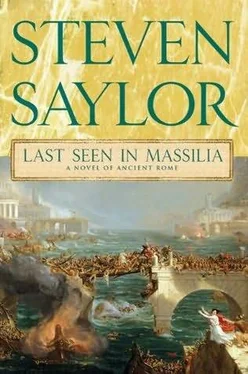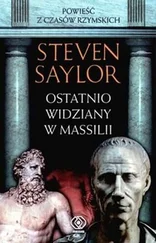Steven Saylor - Last seen in Massilia
Здесь есть возможность читать онлайн «Steven Saylor - Last seen in Massilia» весь текст электронной книги совершенно бесплатно (целиком полную версию без сокращений). В некоторых случаях можно слушать аудио, скачать через торрент в формате fb2 и присутствует краткое содержание. Жанр: Исторический детектив, на английском языке. Описание произведения, (предисловие) а так же отзывы посетителей доступны на портале библиотеки ЛибКат.
- Название:Last seen in Massilia
- Автор:
- Жанр:
- Год:неизвестен
- ISBN:нет данных
- Рейтинг книги:3 / 5. Голосов: 1
-
Избранное:Добавить в избранное
- Отзывы:
-
Ваша оценка:
- 60
- 1
- 2
- 3
- 4
- 5
Last seen in Massilia: краткое содержание, описание и аннотация
Предлагаем к чтению аннотацию, описание, краткое содержание или предисловие (зависит от того, что написал сам автор книги «Last seen in Massilia»). Если вы не нашли необходимую информацию о книге — напишите в комментариях, мы постараемся отыскать её.
Last seen in Massilia — читать онлайн бесплатно полную книгу (весь текст) целиком
Ниже представлен текст книги, разбитый по страницам. Система сохранения места последней прочитанной страницы, позволяет с удобством читать онлайн бесплатно книгу «Last seen in Massilia», без необходимости каждый раз заново искать на чём Вы остановились. Поставьте закладку, и сможете в любой момент перейти на страницу, на которой закончили чтение.
Интервал:
Закладка:
Cydimache made no answer. I peered at her cloaked figure in the dim light. It seemed to me that she was like an oracle that would not speak-obscure, mysterious, in this world but not entirely of it. I could see nothing at all of her deformed face or body, yet her posture spoke undeniably of torn loyalties and heartbreaking grief-or did I only imagine this, misreading the silhouette of a veiled hunchback?
Zeno extricated himself from her touch-not brusquely, but tenderly-and stood. "All I know, father-in-law, is that while I was out there today, watching our ships go up in flames or crack apart and vanish in the waves, I didn't hear men yelling your name, or Pompey's name, or `For the Timouchoi!' I heard men crying `Caesar!' They screamed his name as they killed, and they screamed it as they died. And the men crying `Caesar!' were the men who won the battle. I expect they shall be crying `Caesar!' when they bring down the walls of Massilia. `Caesar!' will be the name we hear as they cut our throats, and `Caesar!' will be in the ears of our wives and daughters when they're stripped and taped and carried off to be slaves."
This was too much for many of the listeners. There were gasps, grunts, cries of "Shame!" and "Hubris!"
Even in the dim light, I could see that Apollonides trembled with fury. "Go!" he whispered hoarsely.
"Why not?" said Zeno. "I've lost my appetite, even for this pathetic fare. Come, wife."
Apollonides turned his gaze to Cydimache, who seemed to hesitate. At last she rose laboriously to her feet and stood, hunched over, beside her husband. With excruciating slowness, the two of them left the garden, Cydimache shambling along, Zeno limping slightly and holding her arm. Apollonides kept his gaze straight ahead.
In the wake of Zeno's exit, the party became strangely animated. The buzz of low conversation came from every corner. People felt obliged to share their outrage at Zeno, or their agreement with him; or perhaps they felt obliged to babble simply to fill the awkward silence.
"Stay here," I whispered to Davus.
As I stepped past Milo, he pointed over his shoulder and muttered, "You'll find them that way," thinking I was searching for the privies. "Primitive, compared to Roman plumbing," he added.
I took a roundabout way, so that it would not be too obvious that I was following Zeno. There was enough movement among the guests and the serving slaves that I attracted no attention.
They had disappeared through a doorway that opened off one of the colonnades. The doorway led to a long, wide hallway. I walked quickly, glancing into the rooms on either side, seeing no one until I came to the far end of the passage, which opened onto yet another courtyard, this one much smaller and more intimate than the one where the dinner was being held. The courtyard was dark and deserted; or so I thought, until I heard hushed voices. They came from the shadows beneath the opposite colonnade.
I held my breath and listened, but the voices were too low for me to make sense of them. They might have been arguing, and one of them was almost certainly a man's voice; beyond that I could only speculate. At last I cleared my throat and spoke. "Zeno?"
There was a long pause. Then I heard the voice of Zeno: "Who is it?"
I stepped from the shadows of the colonnade and into the faint starlight of the open courtyard. "My name is Gordianus," I said.
A longer pause. Then: "Do I know you?"
"No. I'm a Roman. A guest of your father-in-law." This was not entirely untrue.
"What do you want?" He emerged from beneath the opposite colonnade and took a few steps toward me. His cape obscured his silhouette, but I thought I saw his right hand move to his waist, as if to reach for a dagger in a scabbard. He took another step toward me.
For a brief moment I was struck by the irony, should my lifeless body be found in this place. How many times had I been called upon to make sense of a corpse discovered in a courtyard, to ferret for clues to the killer's identity, to make sense of the crime? What a jest of the gods if Gordianus the Finder should meet his end as just such a victim as those he had spent his life puzzling over! A slave would find my body, an alarm would be raised, and the First Timouchos's dinner party disrupted. The stab wounds would be noted and the identity of the victim a mystery until someone-Domitius, Milo, Davus, Apollonides himself? — identified me. But from that point it seemed unlikely that anyone would spare much time or effort trying to solve my murder, except perhaps poor Davus.
Unless…
For the briefest of instants, perhaps no longer than the blink of an eye, I entertained a most peculiar fantasy: Meto was still alive and in Massilia, and this was his story, not mine. I was the one destined to die, not he; and he was the one destined to grieve for me and search for my killer. I was merely the victim in someone else's story, mistakenly thinking myself to be the protagonist! This fantasy was so powerful that I was wrenched out of the moment, abruptly disengaged from reality, cast into the world where sleepwalkers dwell. It was a foreshadowing of death, such as all men must occasionally feel, especially as they grow older. What is it to be a lemur, after all, but to be written out of the world's story, to become a name spoken in the past tense, to mutely watch from the shadows while others carry on the tale of the living?
I shivered. Perhaps I lurched a bit, for Zeno stepped forward again and said, "Are you unwell?"
"Quite well," I managed to say. "But I couldn't help but notice that you walk with a slight limp."
He stiffened. From guilt, or merely in response to a stranger's rudeness? "A battle wound," he finally answered.
"From today's battle? Or have you had that limp for several days?"
He had drawn so close that even by starlight I could see the frown on his handsome face. "Who are you to ask me such a question?"
"In Rome they call me the Finder. Even here, some of your fellow citizens have heard of me. One of them came to me the other day, a man named Arausio. He was grieving for his daughter. Her name was Rindel."
Beyond Zeno, a figure moved from behind one of the concealing columns. The deep shadows of the colonnade still obscured her, but the misshapen silhouette of Cydimache was unmistakable.
"What do you want?" asked Zeno sharply, whispering. "Why are you telling me this?"
I lowered my voice to match his. "Does the name Arausio mean nothing to you? Or the name Rindel?"
Again he reached toward his dagger. I felt a tremor of fear, but his agitation emboldened me. "Listen to me, Zeno. Arausio thinks he knows what became of his daughter, but he can't be sure-"
"What concern is this of yours, Roman?"
"When a father loses a child, he needs to know the truth. The pain of not knowing gnaws at a man, robs his sleep, poisons every breath. Believe me, I know! Arausio believes that only you can tell him the truth of what happened to his daughter." I glanced at the figure of Cydimache, which remained in the shadows. "If you have nothing to hide, then why have we lowered our voices to keep your wife from hearing?"
"My wife-" Zeno seemed to choke on the word. "My wife has nothing to answer for. If you dare even to speak her name, I swear by Artemis that I'll kill you where you stand!"
He had killed men already that day. I couldn't doubt that he would kill one more. Did I dare to push him any harder? If he saw me reach into the little pouch at my waist, he might misinterpret the movement and draw his dagger; so I moved very slowly and said very softly, "I have something I want to show you, Zeno. It's in this pouch. Here, I'm pulling it out now. Can you see it between my fingers?"
I found myself wishing that the light was stronger, the better for him to see the ring and for me to study his face. Did he recognize the ring or not?
Читать дальшеИнтервал:
Закладка:
Похожие книги на «Last seen in Massilia»
Представляем Вашему вниманию похожие книги на «Last seen in Massilia» списком для выбора. Мы отобрали схожую по названию и смыслу литературу в надежде предоставить читателям больше вариантов отыскать новые, интересные, ещё непрочитанные произведения.
Обсуждение, отзывы о книге «Last seen in Massilia» и просто собственные мнения читателей. Оставьте ваши комментарии, напишите, что Вы думаете о произведении, его смысле или главных героях. Укажите что конкретно понравилось, а что нет, и почему Вы так считаете.










